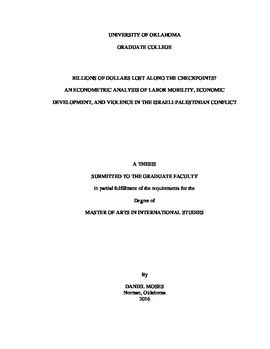| dc.contributor.advisor | Grier, Robin | |
| dc.contributor.author | Moses, Daniel | |
| dc.date.accessioned | 2016-05-13T21:35:20Z | |
| dc.date.available | 2016-05-13T21:35:20Z | |
| dc.date.issued | 2016-05 | |
| dc.identifier.uri | https://hdl.handle.net/11244/34695 | |
| dc.description.abstract | The Israeli-Palestinian conflict has now persisted for nearly 70 years with little progress towards a solution, and the conflict continues to exact high costs on both societies year after year. Unfortunately, the failure of the Middle East peace process—in particular the Oslo Peace Process—has left little hope for a peaceful resolution to the conflict and has resulted in capricious violence within Israel and the Palestinian Territories since the 1990s. This study argues that economic development can reduce the magnitude of violence in the short term, but politically motivated violence will persist in the absence of a resolution. A historical analysis of Israeli-Palestinian economic dynamics reveals that Israel’s stringent control of the Palestinian Territories has exacted high costs on the Israeli economy since the 1967 Six-Day War. This leads to the conclusion that increasing the number of West Bank Palestinians working in Israel is the best path towards peace given the current state of affairs in the conflict. However, increasing the number of Palestinians working in Israel might result in an increase in the rate of violence. Using an agent-based dynamic equilibrium model and the best available research on the relationship between economic development, politics, and violence, this study finds that Israel should not impose border closures on Palestinians with work permits unless the rate of violence reaches 4.2 fatalities per day over a given period of time. Israeli economic production will not be reduced by violence even if Israel doubles the number of West Bank Palestinians working in Israel to more than 200,000 people. | en_US |
| dc.language | en_US | en_US |
| dc.subject | Economic Development, Violence, Israeli-Palestinian Conflict | en_US |
| dc.title | Billions of Dollars Lost Along the Checkpoints? An Econometric Analysis of Labor Mobility, Economic Development, and Violence in the Israeli-Palestinian Conflict | en_US |
| dc.contributor.committeeMember | Landis, Joshua | |
| dc.contributor.committeeMember | Lewental, D. Gershon | |
| dc.date.manuscript | 2016-05 | |
| dc.thesis.degree | Master of Arts in International Studies | en_US |
| ou.group | College of International Studies | en_US |
